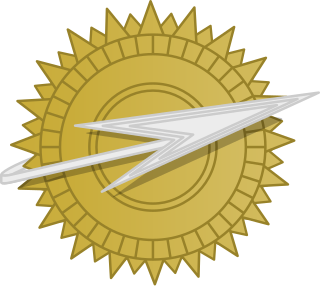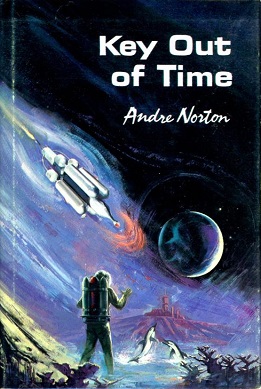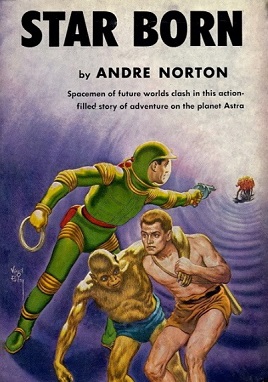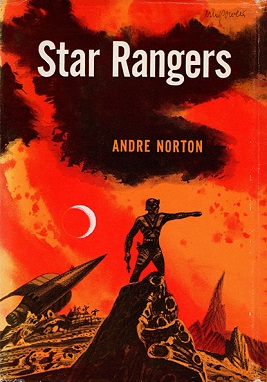
Murray Leinster was a pen name of William Fitzgerald Jenkins, an American writer of genre fiction, particularly of science fiction. He wrote and published more than 1,500 short stories and articles, 14 movie scripts, and hundreds of radio scripts and television plays.

The Vogons are a fictional alien race from the planet Vogsphere in The Hitchhiker's Guide to the Galaxy—initially a BBC Radio series by Douglas Adams—who are responsible for the destruction of the Earth, in order to facilitate an intergalactic highway construction project for a hyperspace express route. Vogons are slug-like but vaguely humanoid, are bulkier than humans, and have green skin. Vogons are described as "one of the most unpleasant races in the galaxy—not actually evil, but bad-tempered, bureaucratic, officious and callous", and having "as much sex appeal as a road accident" as well as being the authors of "the third worst poetry in the universe". They are employed as the galactic government's bureaucrats. According to Marvin the Paranoid Android, they are also the worst marksmen in the galaxy. They follow orders as they were told to and will not allow exceptions.
Arthur Bertram Chandler was an Anglo-Australian merchant marine officer, sailing the world in everything from tramp steamers to troop ships, but who later turned his hand to a second career as a prolific author of pulp science fiction. He also wrote under the pseudonyms of George Whitley, Andrew Dunstan and S.H.M. Many of his short stories draw on his extensive sailing background. In 1956, he emigrated to Australia and became an Australian citizen. By 1958 he was an officer on the Sydney-Hobart route. Chandler commanded various ships in the Australian and New Zealand merchant navies, including his service as the last master of the Australian aircraft carrier HMAS Melbourne; by law, the ship was required to have an officer on board while awaiting its towing to China to be broken up. Chandler wrote over 40 novels and 200 works of short fiction, winning the Australian Ditmar Awards for the short story "The Bitter Pill" and for three novels: False Fatherland, The Bitter Pill, and The Big Black Mark. One of Chandler's daughters, Jenny Chandler, married British horror fiction writer Ramsey Campbell. His other children were Penelope Anne Chandler and Christopher John Chandler.

The Galactic Empire is an interstellar empire featured in Isaac Asimov's Robot, Galactic Empire, and Foundation series. The Empire is spread across the Milky Way galaxy and consists of almost 25 million planets settled exclusively by humans. For over 12 millennia the seat of imperial authority was located on the ecumenopolis of Trantor, whose population exceeded 40 billion, until it was sacked in the year 12,328. The official symbol of the empire is the Spaceship-and-Sun. Cleon II was the last Emperor to hold significant authority. The fall of the empire, modelled on the fall of the Roman Empire, is the subject of many of Asimov's novels.

Bill, the Galactic Hero is a satirical science fiction novel by American writer Harry Harrison, first published in 1965. A novella length version appeared in the magazine Galaxy Science Fiction in 1964 under the name "The Starsloggers".
"Neutron Star" is an English language science fiction short story by American writer Larry Niven. It was originally published in the October 1966 issue of Worlds of If. It was later reprinted in the collection of the same name and Crashlander. The story is set in Niven's fictional Known Space universe. It is notable for including a neutron star before their existence was widely known.

The Beast Master is a science fiction novel by American writer Andre Norton, published by Harcourt in 1959. It inaugurated the Beast Master series, or Hosteen Storm series after the main character. In German-language translation it was published as Der Letzte der Navajos —literally, The Last of the Navajo.

Star Guard is a science fiction novel by American writer Andre Norton, published in 1955 by Harcourt, Brace & Company. It is an example of military science fiction, based on European ancient history.
These works were written or edited by the American fiction writer Andre Norton. Before 1960 she used the pen name Andrew North several times and, jointly with Grace Allen Hogarth, Allen Weston once.

The Time Traders is a science fiction novel by American writer Andre Norton, the first in The Time Traders series. It was first published in 1958, and has been printed in several editions. It was updated by Norton in 2000 to account for real world changes. It is part of Norton's Forerunner universe.

Sargasso of Space is a science fiction novel by American writer Andre Norton, written under the alternate pseudonym "Andrew North". It was published in 1955 by Gnome Press in an edition of 4,000 copies.

Galactic Odyssey is a science fiction novel by American writer Keith Laumer. It was originally serialized in If magazine from May to July, 1967, under the title Spaceman. Later the same year it was published as a standalone novel titled Galactic Odyssey.

The Defiant Agents is a science fiction novel by American writer Andre Norton, the third book in her Time Traders series. It was first published in 1962, and as of 2012, had been reprinted in ten editions with cover changes, as well as twice in a combined edition with Key Out of Time. It is part of Norton's Forerunner universe.

Key Out of Time is a science fiction novel by American writer Andre Norton, set on the world, Hawaika, that appears to be a tropical paradise.

Rocket to Limbo is a 1957 science fiction novel by Alan E. Nourse. It was first published in book form by David McKay Co., Inc, and was later incorporated into an Ace Double. It first appeared in the October 1957 issue of Satellite Science Fiction.

Star Born is a science fiction novel by American writer Andre Norton, first published in 1957 by World Publishing Company of Cleveland. As the sequel to The Stars Are Ours!, Star Born continues its predecessor's adventure three generations later.

Star Rangers, also known as The Last Planet, is a science fiction novel by the American author Andre Norton. The novel was published on August 20, 1953, by Harcourt, Brace & Company. This is one of Norton's Central Control books, which lay out the history of a galactic empire through events suggested by Norton's understanding of Terran history.














